Veterinary Science
UCAS code D100
- Study mode
- Full-time
- Duration
- 5 years
- Start date and application deadlines
-
- Start date
- September 2026
- Apply by:
- Starts on:
UCAS code D100
We've set the country or region your qualifications are from as United Kingdom.
Our course is designed to create practical, compassionate and resilient veterinary surgeons and to equip our graduates with the skills and qualities required to practice in the 21st century.
The Bachelor of Veterinary Science (BVSc) programme offers world-leading scientific and clinical training in veterinary medicine. The BVSc is internationally accredited and on graduation, you will be qualified to practise as a veterinary surgeon in the UK (RCVS), Ireland and Europe (EAEVE), Australia and New Zealand (AVBC), South Africa (SAVC), North America (AVMA) and many other countries around the world.
Our students get to enjoy a vibrant university experience for the first three years of the course, based at the central Liverpool campus. Years 4 and 5 are based at our Leahurst site, on the stunning Wirral, with North Wales on your doorstep.
Liverpool vet school offers in-depth clinical and research-based training and a hugely motivated, dedicated teaching staff. The university provides all of its own teaching across all five years of the course, using our two farms (covering beef and dairy cattle, pigs and sheep), our own teaching horses and our own teaching clinics. Across these sites our students have access to over 10,000 small animal cases a year, and over 5,000 equine and large animal cases.
Our integrated spiral curriculum offers an innovative approach to teaching and learning, where subjects are revisited year on year with an increasing focus on clinical application as the course progresses.
Your study will commence with animal handling, the science of normal structure and function, the welfare and husbandry of animals and the incidence and distribution of disease.
You will continue to build on this knowledge in second year, adding pathology and parasitology, further practical techniques and learning about veterinary research in our research skills course. In third year, you will study pathology and parasitology in more detail start the clinical science course and complete a research project, allowing you to study an area of interest in much more detail.
You will begin learning and using clinical skills from day one, taking advantage of our dedicated facilities to practise the essential techniques required in every field of veterinary practice such as bandaging, injection technique, lab analysis, suturing and knot tying.
Our professional skills thread also starts in year one. You will learn how to communicate effectively with others, in both written and spoken form, and you will get to put this into practice with professional actors who act as your clients in simulated veterinary consultations. You will also learn about the importance of practice finance and how veterinary businesses operate.
In fourth year, you will move to Leahurst. You will complete a lecture based clinical theory course by the February of fourth year and then complete 31 weeks of clinical rotations spread fairly equally between production animal, equine and small animals with a dedicated rotation in exotics medicine. Over 90% of rotations take place at the Leahurst Campus, with students additionally gaining front line experience in commercial practices during their 20 weeks of extra-mural studies (EMS).
Following your clinical rotations, you will have the chance to choose a 3-week elective subject to study in greater depth. You also have the opportunity to take a year out from the veterinary science programme to study in China or for an additional, intercalated degree. A wide variety of subjects are available, both at Liverpool and other universities in the UK and abroad.
During clinical rotations, you will have the opportunity to join up to a 3-month exchange programme with one of our partner vet schools in Europe and the USA:
Explore our Global Opportunities Search Tool for further information.

We’ve been awarded a Gold rating for educational excellence.
Discover what you'll learn, what you'll study, and how you'll be taught and assessed.
Programme details and modules listed are illustrative only and subject to change.
Programme details and modules listed are illustrative only and subject to change.
Programme details and modules listed are illustrative only and subject to change.
Programme details and modules listed are illustrative only and subject to change.
Programme details and modules listed are illustrative only and subject to change.
There is a combination of problem-based learning, didactic teaching and small-group practical classes allowing students to develop lifelong learning techniques.
We have a distinctive approach to education, the Liverpool Curriculum Framework, which focuses on research-connected teaching, active learning, and authentic assessment to ensure our students graduate as digitally fluent and confident global citizens.
The Liverpool Curriculum framework sets out our distinctive approach to education. Our teaching staff support our students to develop academic knowledge, skills, and understanding alongside our graduate attributes:
Our curriculum is characterised by the three Liverpool Hallmarks:
All this is underpinned by our core value of inclusivity and commitment to providing a curriculum that is accessible to all students.
Studying with us means you can tailor your degree to suit you. Here's what is available on this course.
University of Liverpool students can choose from an exciting range of study placements at partner universities worldwide.
Immerse yourself in Chinese culture on an optional additional year at Xi'an Jiaotong Liverpool University in stunning Suzhou.
Every student at The University of Liverpool can study a language as part of, or alongside their degree. You can choose:
Enjoy both city and rural lifestyles on our programme. We’re distinct in the UK in that we have two farms, alongside three first-opinion practices and two referral hospitals on campus meaning you can get real experience of all aspects of veterinary practice: equine, large animal, and small animal. You’ll also benefit from our close associations with Chester Zoo.
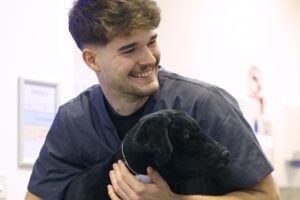

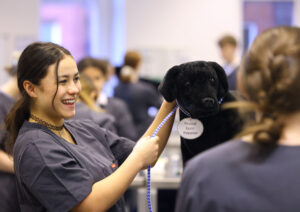
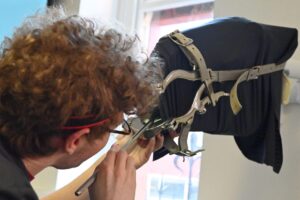
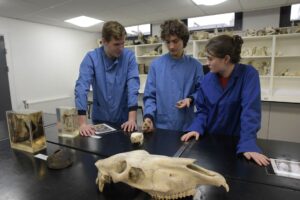
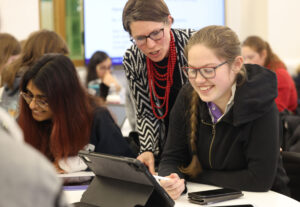
From arrival to alumni, we’re with you all the way:

Want to find out more about student life?
Chat with our student ambassadors and ask any questions you have.
Studying this degree will prepare you for a wide range of careers in animal sciences and the vast majority of veterinary students find employment within six months of graduation.
Most newly qualified vets choose to work in private veterinary practices but many graduates find work in:
You can explore the following postgraduate opportunities here at Liverpool:
100% of veterinary science students find their main activity after graduation meaningful.
(Graduate Outcomes, 2018-19.)
My qualifications are from United Kingdom.
Your tuition fees, funding your studies, and other costs to consider.
Full-time place, per year - £9,790
Year in industry fee - £1,955
Year abroad fee - £1,465 (applies to year in China)
Full-time place, per year - £44,850
Year in industry fee - £1,955
Year abroad fee - £22,425 (applies to year in China)
The fees shown are for the academic year 2026/27. Please be advised that tuition fees may increase each year for both UK and international students. For UK students, this will be subject to the government’s regulated fee limits.
Tuition fees cover the cost of your teaching and assessment, operating facilities such as libraries, IT equipment, and access to academic and personal support. Learn more about paying for your studies.
We understand that budgeting for your time at university is important, and we want to make sure you understand any course-related costs that are not covered by your tuition fee. This could include buying a laptop, books, or stationery.
Find out more about the additional study costs that may apply to this course.
We’re showing the scholarships available to students from United Kingdom.
We offer a range of scholarships and bursaries that could help pay your tuition and living expenses.
If you’re a UK student joining an undergraduate degree and have a household income below £35,000, you could be eligible for a Liverpool Bursary worth up to £2,000 for each year of undergraduate study.
If you’ve spent 13 or more weeks in Local Authority care since age 14, you could be eligible for a bursary of £3,000 per year of study. You’ll need to be a UK student joining an eligible undergraduate degree and be aged 28 or above on 1 September in the year you start.
Are you a UK student with a Black African or Caribbean heritage and a household income of £25,000 or less? You could be eligible to apply for a Cowrie Foundation Scholarship worth up to £8,000 for each year of undergraduate study.
If you’re a UK student identified as estranged by Student Finance England (or the equivalent UK funding body), you could be eligible for a bursary of £1,000 for each year of undergraduate study.
Joining a School of Biosciences degree and have a household income of less than £25,000? If you’re a UK student, you could apply to receive £4,500 per year for three years of your undergraduate course.
Do you live in the Liverpool City Region with a household income of £25,000 or less? Did neither of your parents attend University? You could be eligible to apply for a Nolan Scholarship worth £5,000 per year for three years of undergraduate study.
Are you a UK student with a household income of £25,000 or less? If you’ve participated in an eligible outreach programme, you could be eligible to apply for a Rigby Enterprise Award worth £5,000 per year for three years of your undergraduate degree.
Are you a UK student with a household income of £25,000 or less? Did neither of your parents attend University? You could be eligible to apply for a ROLABOTIC Scholarship worth £4,500 for each year of your undergraduate degree.
Apply to receive tailored training support to enhance your sporting performance. Our athlete support package includes a range of benefits, from bespoke strength and conditioning training to physiotherapy sessions and one-to-one nutritional advice.
Joining a degree in the School of Electrical Engineering, Electronics and Computer Science? If you’re a UK student with household income below £25,000, you could be eligible to apply for £5,000 a year for three years of study. Two awards will be available per academic year.
If you’re a young adult and a registered carer in the UK, you might be eligible for a £1,000 bursary for each year of study. You’ll need to be aged 18-25 on 1 September in the year you start your undergraduate degree.
My qualifications are from United Kingdom.
The qualifications and exam results you'll need to apply for this course.
Please refer to the Veterinary Science Prospective Applicants page for important guidance notes and detailed information for BVSc (D100) applicants.
Applicants to Veterinary Science should be aware that students will be required as part of the registration process at the start of their studies to undergo an occupational health assessment.
Please note that admission to our foundation year is limited to mature students who have typically been out of formal education for some time, or who have taken non-traditional qualifications.
| Qualification | Details |
|---|---|
| A levels |
AAA including Biology (or Human Biology) and Chemistry. If Chemistry is not taken at A level, it must be taken at AS level (at grade B or above) and the second A level must be another academic science-related subject.You may automatically qualify for reduced entry requirements through our contextual offers scheme. Based on your personal circumstances, you may automatically qualify for up to a two-grade reduction in the entry requirements needed for this course. When you apply, we consider a range of factors – such as where you live – to assess if you’re eligible for a grade reduction. You don’t have to make an application for a grade reduction – we’ll do all the work. Find out more about how we make reduced grade offers. If you don't meet the entry requirements, you may be able to complete a foundation year which would allow you to progress to this course. Available foundation years: |
| T levels |
T levels are not currently accepted. |
| GCSE |
At least five GCSEs at grade 7 (A) including two science GCSEs (either as separate subjects or e.g. dual award science). With at least a grade 6 (B) in English (literature or language) and Mathematics. |
| Subject requirements | For applicants studying A levels with English exam boards: Where a science has been taken at A level (Chemistry, Biology, Geology or Physics), a pass in the Science practical of each subject will be required. |
| BTEC Level 3 National Extended Diploma | We no longer accept BTEC qualifications. |
| International Baccalaureate | 36 points overall to include, Grade 6 at Higher Level Biology, Grade 6 at Higher Level Chemistry, Grade 6 at Higher Level in any other subject. |
| Irish Leaving Certificate | The recognised A level equivalent qualification is the Irish Higher Leaving Certificate. H1, H1, H2, H2, H2, H2 (new grading system) OR A1, A1, A1, A1 (old grading system). Biology: (H1); Chemistry: (H1); English: (O3 at Ordinary Level or H6 at Higher Level); Maths: (O3 at Ordinary Level/Standard Level or H6 at Higher Level). |
| Scottish Higher/Advanced Higher | Not accepted without Advanced Highers. Grade B in Biology at Advanced Higher, Grade B in Chemistry at Advance Higher, Grade AA in Biology and Chemistry and Grades AAB in 3 other subjects at Higher Level. |
| Welsh Baccalaureate Advanced | Accepted in place of a third A level |
| Access | Kitemarked level 3 Access to Medicine at pre-approved colleges is required with a minimum of 15 credits in Biology and a minimum of 15 credits in Chemistry. Approval MUST be obtained prior to application. Please contact the Admissions Office for further information. |
| Work Experience Requirements | Candidates should have work experience in both animal husbandry and clinical (veterinary practice) setting. For more information, please see the Veterinary Science Prospective Applicants page. |
| International qualifications |
Many countries have a different education system to that of the UK, meaning your qualifications may not meet our entry requirements. |
You'll need to demonstrate competence in the use of English language, unless you’re from a majority English speaking country.
We accept a variety of international language tests and country-specific qualifications.
| Qualification | Details |
|---|---|
| IELTS | 7.0 overall, with no component below 7.0 |
| TOEFL iBT | If you took a TOEFL test on or before 20 January 2026, you’ll need 100 overall, with minimum scores of listening 24, writing 24, reading 24 and speaking 26. If you took a TOEFL test from 21 January 2026 onwards, when a new scoring system was introduced, you’ll need 5 overall, with 5 or above in all components. TOEFL Home Edition not accepted. |
| Pearson PTE Academic | 69 overall, with no component below 69 |
| Cambridge IGCSE First Language English 0500 | Grade B overall, with a minimum of grade 2 in speaking and listening. Speaking and listening must be separately endorsed on the certificate. |
| Cambridge IGCSE First Language English 0990 | Grade 6 overall, with Merit in speaking and listening |
| Cambridge IGCSE Second Language English 0510/0511 | 0510: Grade B overall, with a minimum of grade 2 in speaking. Speaking must be separately endorsed on the certificate. 0511: Grade B overall. |
| Cambridge IGCSE Second Language English 0993/0991 | 0993: Grade 6 overall, with a minimum of grade 2 in speaking. Speaking must be separately endorsed on the certificate. 0991: Grade 6 overall. |
| International Baccalaureate English A: Literature or Language & Literature | Grade 6 at Standard Level or grade 6 at Higher Level |
| International Baccalaureate English B | Grade 7 at Higher Level |
Have a question about this course or studying with us? Our dedicated enquiries team can help.
Last updated 5 February 2026 / / Programme terms and conditions